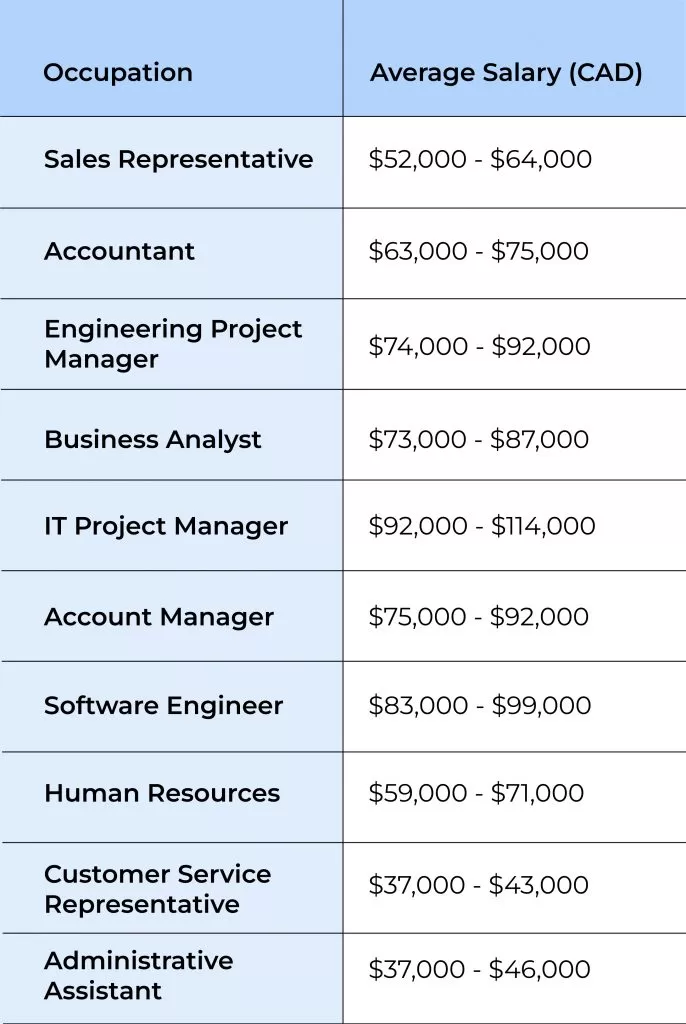
Are you considering applying for permanent residency in Canada? If so, you’re not alone. Canada has become an increasingly popular destination for individuals looking to start a new life abroad. With its welcoming immigration policies, strong economy, and high quality of life, it’s no wonder that so many people are choosing to make Canada their permanent home.
In this comprehensive guide, we will walk you through the process of applying for permanent residency in Canada, the benefits of becoming a permanent resident, and the various pathways available to you. So, let’s get started!
Why Choose Canada for Permanent Residency?
Canada is known for its inclusive and diverse society, excellent healthcare system, and strong economy. Here are some of the top reasons why you should consider applying for permanent residency in Canada:
1. Job Opportunities:
Canada is experiencing a shortage of skilled workers in various industries, with over 1 million job vacancies remaining unfilled for more than 100 days. This means that there are ample job opportunities for qualified individuals.
2. Freedom to Live, Work, and Study Anywhere in Canada:
Permanent residency gives you the freedom to live, work, and study in any province or territory in Canada. You are not limited to a specific location and have the flexibility to explore different opportunities and communities within the country.
3. Higher Income:
On average, salaries in Canada are 5 to 8 times higher than those in many other countries. This means that you can earn a higher income and enjoy a better standard of living.
4. Protection under Canadian Law:
As a permanent resident, you are protected under Canadian law and the Canadian Charter of Rights and Freedoms. This means that you have legal rights and protections, ensuring your safety and well-being while living in Canada.
5. Universal Healthcare:
As a permanent resident of Canada, you will have access to the country’s universal healthcare system has a universal health care system funded through taxes. This means that any Canadian citizen or permanent resident can apply for public health insurance. Each province and territory has a different health plan that covers different services and products. This means that you and your family will receive high-quality medical care, including doctor visits, hospital stays, and prescription medications, without having to worry about exorbitant healthcare costs.
6. Access to High-Quality Education:
Canada is known for its excellent education system, with top-ranked universities and colleges. As a permanent resident, you and your children have access to free education for children from kindergarten to grade 12. Additionally, you can pursue higher education at post-secondary institutions with discounted tuition fees for permanent residents.
7. Opportunities for Family Reunification:
Permanent residency allows you to sponsor your eligible family members for permanent residency in Canada. This means that you can bring your spouse, children, parents, or grandparents to join you and build a new life together.
8. Retirement Benefits:
As a permanent resident, you will be eligible for retirement benefits through the Canadian Pension Plan (CPP) This ensures that you can enjoy a comfortable retirement and financial security in your golden years.
9. Easiest Path to Canadian Citizenship:
Obtaining permanent residency is the first step towards becoming a Canadian citizen. After living in Canada as a permanent resident for 4 years, you can apply for citizenship, provided you meet the eligibility criteria. Canadian citizenship offers numerous benefits, including the right to vote and run for political office.
Jobs in Canada for Permanent Residents
Canada is experiencing a signifiant demand for skilled professionals in various industries. According to Stat Can, there are over 1 million job vacancies in the country. This presents excellent job opportunities for permanent residents who are looking to start a new career or advance their current one.
Here are some of the top in-demand occupations in Canada along with their average salary ranges:
These salary ranges are indicative and may vary depending on factors such as location, years of experience, and industry. It’s important to research specific job opportunities and salary ranges in your desired field and location.
In addition to the above occupations, the IT sector in Canada is experiencing significant growth and demand for skilled professionals. Here are some of the top IT jobs in Canada:
- Developer/Programmer
- Business System Analyst/Administrator
- Data Analyst/Scientist
- Quality Assurance Analyst
- Security Analyst/Architect
- Cloud Architect
- IT Project Manager
- Network Engineer
These IT jobs offer competitive salaries and excellent career prospects. If you have a background in IT, consider exploring job opportunities in Canada.
The Canada Permanent Residency Process
The process of obtaining permanent residency in Canada is relatively straightforward and consists of 7 key steps. These steps apply to most immigration programs, including Express Entry, Provincial Nominee Program (PNP), Quebec Immigration, Atlantic Immigration Program, Canada Start-up Visa Program, and the Canada PR by investment.
Here is an overview of the 7 steps involved in the Canada permanent residency process:
1. Determine Your Eligibility:
Before you begin the application process, it’s essential to determine if you meet the eligibility criteria for permanent residency in Canada. Factors such as age, education, work experience, language proficiency, and adaptability will be assessed.
2. Choose the Right Immigration Program:
Canada offers various immigration programs, each with its own set of requirements and pathways to permanent residency. Research and choose the program that best suits your qualifications and goals.
3. Complete Language Ability Tests
Language ability is a crucial factor in the permanent residency application process. You will need to take an English or French language test, such as IELTS or CELPIP, to demonstrate your proficiency.
4. Obtain Educational Credential Assessment (ECA):
If you completed your education outside of Canada, you will need to obtain an Educational Credential Assessment (ECA) to prove that your foreign education is equivalent to Canadian standards.
5. Gather Required Documents:
Collect all the necessary documents to support your permanent residency application, including identification documents, educational certificates, work experience letters, language test results, and proof of funds.
6. Submit Your Application:
Complete and submit your permanent residency application online or by mail. Be sure to provide accurate and truthful information, including details about your education, work experience, language proficiency, and personal background.
7. Wait for Application Processing and Approval:
After submitting your application, it will be reviewed by an immigration officer. You may be asked to provide additional information or attend an interview. Once approved, you will receive confirmation of your permanent residency status and a Confirmation of Permanent Residence (COPR) card.
Canada Permanent Residency Requirements
To be eligible for permanent residency in Canada, you must meet certain requirements. These requirements may vary depending on the immigration program you choose. Here are the key factors that will be considered:
Age
The age of the applicant is an important factor in the permanent residency process. Candidates between the ages of 18 and 35 receive the maximum points, while those above 35 receive fewer points. The maximum age to qualify for permanent residency is 45 years.
Education
Your educational qualifications will be assessed to determine if they meet Canadian standards. Generally, a higher secondary education level or higher is required. You will need to provide educational certificates and transcripts for assessment.
Work Experience
To qualify for permanent residency, you must have at least one year of full-time work experience. More years of work experience will earn you more points. Your occupation must be classified as Skill Type 0, Skill Level A, or Skill Level B according to the National Occupational Classification (NOC).
Language Ability
Proficiency in English or French is crucial for successful integration into Canadian society. You will need to take a language test, such as IELTS or CELPIP . For the English language skills requirements, you have two options: the Canadian English Language Proficiency Index Program (CELPIP) or the International English Language Testing System (IELTS) test. Both tests are accepted by Citizenship and Immigration Canada and achieve a minimum score of 6 bands. If you are proficient in French, you can earn additional points.
Adaptability
If your spouse or common-law partner is willing to immigrate with you to Canada, you can earn additional points for adaptability. This factor considers your ability to settle in Canada and establish a successful life.
Arranged Employment
Having a valid job offer from a Canadian employer can earn you additional points in the permanent residency process. A job offer must meet certain requirements, such as being in a skilled occupation and meeting minimum salary thresholds.
Police Verification Certificate
As part of the application process, you will be required to provide a police verification certificate from the countries where you have lived for a specified period of time. This certificate ensures that you have a clean criminal record.
It’s important to note that these requirements may vary depending on the immigration program you choose. Be sure to check the specific criteria for your chosen program.
Pathways to Permanent Residency in Canada
There are several pathways available to individuals who wish to obtain permanent residency in Canada. The most common pathways include:
1. Express Entry
The Express Entry system is a popular pathway for skilled workers who want to immigrate to Canada. It manages the applications for three federal economic immigration programs: the Federal Skilled Worker Program (FSWP), the Federal Skilled Trades Program (FSTP), and the Canadian Experience Class (CEC).
To apply through Express Entry, you need to create an online profile and provide information about your education, work experience, language skills, and other factors. Your profile will be ranked based on the Comprehensive Ranking System (CRS), which assigns points for various factors. The highest-ranking candidates are invited to apply for permanent residency through regular draws.
2. Provincial Nominee Program (PNP)
The Provincial Nominee Program (PNP) allows provinces and territories in Canada to nominate individuals who have the skills and experience needed in their specific region. Each province and territory has its own unique PNP streams and criteria.
To apply through a PNP, you need to meet the eligibility requirements of the specific province or territory you wish to settle in. If nominated, you will receive a Provincial Nomination, which gives you additional points in the Express Entry system and increases your chances of receiving an Invitation to Apply (ITA) for permanent residency.
3. Quebec Immigration
Quebec has its own immigration system, separate from the federal programs. The Quebec Skilled Worker Program (QSWP) is designed for individuals who want to settle in the province of Quebec. Applicants must meet specific criteria, including language proficiency in French and a job offer from an employer in Quebec.
To apply through the QSWP, you need to submit an Expression of Interest (EOI) and receive a Quebec Selection Certificate (CSQ). Once you have the CSQ, you can apply for permanent residency through the federal government.
4. Atlantic Immigration Program
The Atlantic Immigration Program is a partnership between the federal government and the Atlantic provinces of New Brunswick, Newfoundland and Labrador, Nova Scotia, and Prince Edward Island. It is designed to attract and retain skilled workers and international graduates to the Atlantic region.
To apply through the Atlantic Immigration Program, you need to meet the eligibility criteria of one of the program’s three streams: the Atlantic High-Skilled Program, the Atlantic Intermediate-Skilled Program, or the Atlantic International Graduate Program. If nominated, you can apply for permanent residency through the federal government.
5. Canada Start-up Visa Program
The Canada Start-up Visa Program is designed for entrepreneurs who have the skills and experience to start a business in Canada. To be eligible, you need to secure a commitment from a designated Canadian venture capital fund, angel investor group, or business incubator.
To apply through the Start-up Visa Program, you need to have a viable business plan and meet the ownership requirements. If approved, you will receive a Letter of Support, which allows you to apply for permanent residency.
6.Canada PR by Investment
The Canada PR by Investment program offers entrepreneurs a pathway to permanent residency through qualifying investments. Investment options include business ventures, job creation, or contributing to a government fund, with varying minimum investment amounts (CAD $200,000 to $2 million). Applicants must submit a comprehensive business plan, meet net worth requirements (CAD $600,000 to $2 million), and create jobs if necessary.
The application process involves submitting funds, documents, and undergoing eligibility assessments. Successful applicants enjoy the benefits of permanent residency, including access to healthcare, education, and the option to apply for Canadian citizenship. Consulting with a specialized immigration professional is advised for guidance through the process.
Total Cost for Canada PR from India
Obtaining permanent residency in Canada involves certain costs. It’s important to be aware of these expenses and plan your budget accordingly. Here is an overview of the total cost for a Canada PR visa:
These cost estimates are subject to change and may vary depending on individual circumstances. It’s important to budget for these expenses and account for additional costs, such as translation fees, travel expenses, and professional immigration consultant fees if applicable.
In addition to the above costs, you will also need to provide proof of funds to support your stay in Canada. The amount of funds required may vary depending on the number of family members accompanying you. Here is a breakdown of the settlement funds required:
- Single applicant: CAD $13,757
- Couple with NO kids: CAD $17,127
- Couple with ONE kid: CAD $21,055
The settlement funds are intended to demonstrate that you have the financial means to support yourself and your family members in Canada until you can secure employment and establish yourself.
Canada PR Processing Time
The processing time for a Canada PR visa can vary depending on the immigration program you choose and the volume of applications being processed. On average, the general processing time for a Canada PR visa is 6 to 8 months.
However, it’s important to note that processing times are subject to change and can vary based on individual circumstances and the complexity of the case. Some applications may be processed faster, while others may take longer due to additional document requests or the need for further verification.
It’s recommended to regularly check the official government websites or consult with an immigration consultant to get the most up-to-date information on processing times for your specific immigration program.
Conclusion
Obtaining permanent residency in Canada is a life-changing opportunity that offers numerous benefits and opens up a world of possibilities. Whether you choose to apply through Express Entry, the Provincial Nominee Program, or other immigration pathways, the process may seem complex, but with the right information and guidance , it can be navigated successfully.
In this comprehensive guide, we have covered the key aspects of applying for permanent residency in Canada, including the benefits, requirements, pathways, and costs involved. We hope this information has given you a clearer understanding of what it takes to become a permanent resident of Canada and the opportunities that await you.
Remember to stay informed, do thorough research, and consult with immigration professionals if needed. With careful planning and preparation, you can embark on a successful journey towards permanent residency in Canada and enjoy all the benefits and opportunities that come with it. Good luck!

With over a decade’s experience in International education with particular interest and commitment to international student experience, she is the brain behind the overseas programme wing and has steered the organization to a position where it figures among the prominent overseas education facilitators in India.





